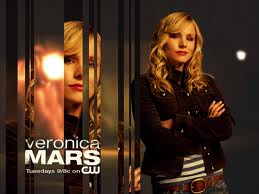Monday, March 18, 2013
How to get the public to pay for a movie
I've talked about crowd-funding in the past but something interesting happened that could change the way movies are made. Or at least some movies.
Several years ago there was a TV series called Veronica Mars. It was about a young girl and her father, who was a cop in a small California beach town. It starred Kristen Bell. The show ran on what was then called UPN and is now called CW. It's the channel that has all the young and beautiful people. But that's another story.
Anyways, the show was cancelled after three years and was gone. But there remained a pretty good fan base who would watch and rewatch the show wherever they could find the old episodes.
Apparently there were a lot of fans.
The show's creator, Rob Thomas, came up with an idea. What if the fans paid for a movie based on the TV show. But, as we all know, it costs money. And Warner Brothers owned the rights. And they weren't about to pay for a movie on a TV show that was cancelled, dead and gone.
So Thomas went to Kickstarter.com.
What is that, you might ask? I'm sure a lot of you know already.
Kickstarter and IndieGoGo are just two crowd-funders and there are dozens more. And what they do is raise the money for you. But not from themselves.
They get it from people like me and you and your uncle and anyone else, and in this case, the fans who continued to like Veronica Mars.
How it works is simple; you put your idea for a movie on either of the above websites and then they open it to the public. In short, the crowd and the funding.
Does it work?
It does work but it is up to the "crowd", meaning anyone who goes to those websites. There is a time limit, 30 days or 40 or whatever the deadline is. People "donate" $10 or more, there is no real limit. One Canadian businessman put in $10,000.
While each "crowd-funder" is different, they all keep the donations until either the amount is raised or the time limit ends. And not all applicants get their money. Many of them don't make it to the amount they need.
Many of the applicants are asking for as little as $5000 to make their movie, others like Paul Schrader, writer of Taxi Driver (in the 1970's) raised around $400,000 to make his movies.
So what does the donator/investor get for putting in their $10 or $10,000?
They can get a copy of the screenplay, or a t-shirt, or have a small part in the movie, or whatever the producer can think of. But they don't get their money back.
Still, they can say they helped finance a movie.
And they're not all movies; there are short films and artistic efforts. In fact crowdfunding can be for anything. And Obama even made it bigger for small business and anyone who wants to startup a business.
And yes, I have considered crowd-funding for the last 4 years or so but can't find the right project. Yet.
So how much money did the Veronica Mars site bring in? Well Thomas was asking for $2 million. He got it by the end of the first day.
So far he's exceeded that amount to a total of $3.5 million. And his deadline is still open.
Subscribe to:
Post Comments (Atom)

.jpg)

No comments:
Post a Comment